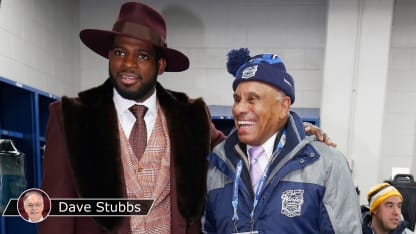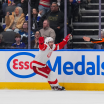MONTREAL -- P.K. Subban doesn't recall the first time he met Willie O'Ree, but the impact and the legacy of the NHL pioneer is deeply ingrained in the Nashville Predators defenseman.
There's no question that when Subban and the Predators host the Arizona Coyotes on Thursday (8 p.m. ET; FS-TN, FS-A, NHL.TV), he will give a thought to O'Ree on the 60th anniversary of the latter becoming the first black player in League history.
O'Ree, NHL's first black player, more than pioneer to Subban
Predators defenseman treasures friendship with man who made history 60 years ago

"I've met Willie so many times," Subban said following a recent practice. "The first time might have been when I was very, very young. As I've gotten to know him, I've understood that he's a role model. And not just to me or other black players in the League, but to any player who might come from a different country or [minority] background.
"I looked then, and now, at Willie as a great man and a great person for how he conducted himself. A lot of people don't talk about the skills he had as a hockey player during his short time in the NHL."
Subban, 28, and O'Ree, 82, have forged a special relationship through the years, meeting at NHL All-Star Games, League functions and wherever their paths cross when O'Ree makes his tireless rounds as diversity ambassador for the NHL's Hockey Is For Everyone initiative, a position he's held for 20 years.
"I'm lucky to have a personal relationship with Willie," Subban said. "Whenever we meet, I'll always spend time with him to catch up and reminisce. He's so astute, so smart and he's very tuned in."
Subban has one such meeting tucked away as a favorite memory, a Black History Month interview conducted by John Saunders of ESPN in February 2015 at Montreal's Bell Centre.
On that occasion, Subban, then with the Montreal Canadiens, and O'Ree sat a mile from where the forward made his historic NHL debut with the Boston Bruins at the Forum on Jan. 18, 1958. They spoke that day for Saunders' ESPN program about the landscape of hockey then and now, and the challenges that O'Ree faced, and Subban faces, as black players.
"I remember we spoke about so many things," Subban said, moved as he spoke of Saunders' death 18 months after the interview. "Willie started telling stories that I'd never heard before, about situations and the intolerance he faced. It was a very special interview, sitting with Willie and John."
That day, just as he has in his talks with O'Ree before and since, Subban marveled at the inner strength the trailblazer needed in 1958 to break the League's color barrier.
Though O'Ree, who scored 14 points (four goals, 10 assists) in 45 games during two NHL seasons, enjoyed the unqualified support of his Bruins teammates and of many fans who were dazzled by his speed, he also heard taunts -- and worse -- from the crowd.
"In the penalty box, stuff would be thrown," he said years later. "They'd spit on me."
In one game against the Chicago Black Hawks (as they were then known), an opponent directed a racial slur at O'Ree and butt-ended him in the mouth, knocking out two teeth and touching off a melee.
"It would have been incredibly difficult for Willie," Subban said. "Racism in sports even today is still talked about so much. It comes in so many different forms that it's sometimes hard to tell when it's happening. It's not just name-calling and things being said. What Willie did in breaking that barrier and coming through to change the sport; in my opinion, he should be in the Hall of Fame.
"A Hall of Famer isn't just the guy who put up great numbers. It's the guy who has changed the sport for the better, who has had an impact. Willie definitely had an impact on hockey and he deserves to be recognized as a Hall of Famer, just as much as a guy like Wayne Gretzky. His impact on the sport is just that great when you think about it. I wouldn't be playing in the League if it wasn't for Willie O'Ree and a man like Herbert Carnegie (a brilliant 1940s and 1950s playmaker in the Quebec Provincial League and Quebec Senior Hockey League)."
Subban said O'Ree's positive example is one that he, and other players, can and should follow and share.
"There are so many guys who can be role models in this way," he said. "We have so many guys in the NHL who can lead by example and I embrace being a role model for a lot of kids.
"The special thing is that I'm able to do a lot of this while I'm playing. You have to remember that when you're in the NHL, you have the platform, and you'll never have a bigger platform than when you're playing."
On the 60th anniversary of O'Ree's historic achievement, Subban will pause to think of his friend, a hockey legend because of who he was, and is.
"Willie had an ability to turn the other cheek to racism and say that he wanted to help the League, to be a big part of its history," Subban said. "Because of Willie, the NHL is more diverse today than it's ever been with players coming in from all over. We know we have an opportunity, and we're thankful for it, because of him."

















